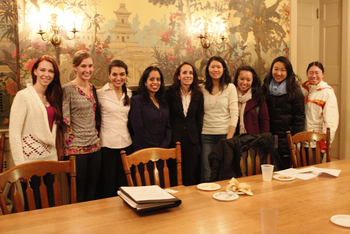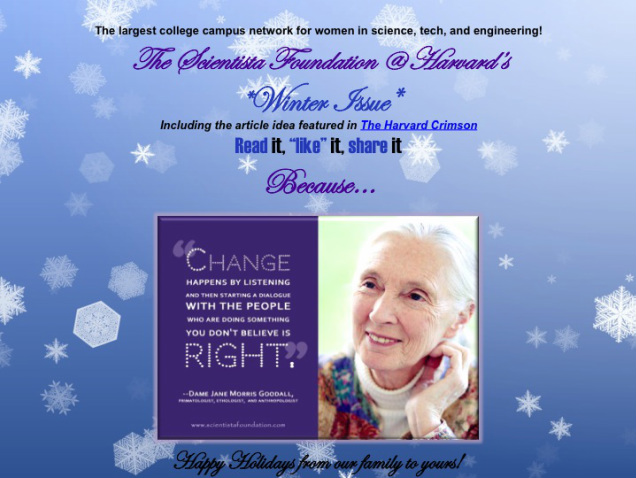|
12/22/2012 0 Comments Untold Stories: Discrimination in STEM By Shaira Bhanji. 14 Author's Note: All of the below stories were submitted in confidence, so no names are attached. See the accompanying feature in The Harvard Crimson here. The stories below are from scientistas who have had experiences dealing with science in which their gender felt like a hindrance. The point of sharing these stories is not to gather pity, but rather to help raise awareness; discrimination in science still does exist. It's real, and many times, the stories are unbelievably disturbing. The Scientista Foundation is still working to combat gender discrimination in the sciences--one scientista at a time. Keep reading to see what motivates us to continue doing what we do. *** Our new post-doc was young, blond and pretty. She was also a brilliant scientist. She worked in the room next to me, but would often stop in to chat with me about my project and life. One day she told me about her previous job where she had faced sexual harassment by her former PI. “I almost did not report it because I was afraid of the backlash that might result. My PI and another lab member treated me terribly after, but I am glad that I spoke out.” After she left the room, I saw two young male post-docs in my room roll their eyes. “She is such a drama queen. She wasn't harassed. She just can’t take a joke,” one said. “She only got hired because of her boobs anyway. Everyone knows he [the PI] only hires hot women,” said the other before breaking into hysterical laughter. It was the first time I encountered subtle gender discrimination in science, but I will never forget it. Soon after, my own post-doc, also a female, quit after an argument over who was getting credit for her work. After weeks of watching her come into work with red eyes, she finally informed me that she was leaving for another lab. Before she left she told me, “Sometimes you just have to let go and realize when you can’t take it anymore.” *** When I was a freshman in college, I knew I wanted to concentrate in the sciences but I didn’t know what specific field. In high school, science was simple – chemistry, physics, and biology. Now, I was suddenly confronted with such options as Organismic and Evolutionary Biology, Human Evolutionary Biology, Neurobiology, Earth and Planetary Sciences, etc. My college held a fair for the freshman to talk to different advisors about each major. As a freshman, I had yet to take a class in one of the fields, but I was very interested in the subject, so I went to talk to one of the advisors. I explained to her my interests and goals and why I was interested in her major. She looked me over and then got this cramped look on her face before telling me, “Perhaps you would do better to look at some of the softer sciences, like Psychology.” Despite feeling like an arrow had been shot through my chest, I thanked her for her time and quickly turned away. I was stunned and hurt. Not only had she insulted another field for no reason (I think Psychology is a great major), but she had also insulted my intelligence without even knowing me for five minutes. I hadn’t said anything or acted idiotic. And yet, from a two-minute conversation, she had decided that I was not smart enough for her major. I was hurt, but I came to realize I must have thicker skin. I also realized that sometimes, a sad fact in the sciences is that one of the biggest barriers to the advancement of women aren’t men or history but rather other women. We attack each other and pick on each other simply because we are consumed by the idea that if another female does well it means less opportunities for us. I am now officially majoring in that field that I was so harshly pushed away from (I am purposefully refraining from remarking on the major because I don’t want it to reflect badly on the advisor). I have learned to have a thicker skin about the things scared people say, and I have learned to stop the cycle by encouraging those around me who are in the sciences. Trust me, there is enough out there in the world to research and investigate that if one person does well it isn’t going to leave less for everyone else to discover. And while I have had negative experiences like this—from advisors telling me I wasn’t doing enough research as a freshman to girls in sciences classes laughing in my face when I asked for help—nothing compares to the passion I feel for science and to the incredible opportunities I have had. So the next time someone tells you to look into a ‘softer science’, just smile and laugh it off–you know yourself better than they do. *** It was another day in my upper-level, male-dominated math class. As usual, I walked in and sat down in the front row. Male after male filled up the seats around me, with another girl sitting down on occasion. I looked around and took out my notebook as the female instructor began her lecture for the day, thinking, “Yeah, that’s right, I’m sitting in the front row.” Later that evening, it was time to do problem sets. I didn’t know many people in the class, so I found someone to check problem sets with. It wasn’t the best arrangement. I could tell he had an air of arrogance, but he was nice when he needed to check homework. One night, as we were checking our homework, we came across a problem I had done incorrectly. Sitting across from me he said, smirking but flirtatious, “Looks like I’ll have to help you brush up some of your math skills.” A few problems later, it was his turn to be wrong. The daring part of me called him out on it. But he brushed it off as being a hard problem. Needless to say, after the course and our problem sets ended, he stopped talking to me altogether. [Edit: The word 'girl' was replaced with 'scientista' to reflect the varied age group. -- 5/30/13] Do you have an untold story you'd like to share anonymously? Email us at [email protected]. All sumbissions remain 100% confidential.Comments? Leave them below! 12/22/2012 0 Comments Scientista Harvard Speaker Series: Straight Talk, Inspiration, and Humor with Dr. Carolann Koleci and Dr. Sujata Bhatia The attendees with Dr. Sujata Bhatia (fourth from left) and Dr. Carolann Koleci (fifth from left). The attendees with Dr. Sujata Bhatia (fourth from left) and Dr. Carolann Koleci (fifth from left). By Leah Gaffney '15 Last month, members of the Harvard College community—including several Scientistas—enjoyed an event put on by Harvard University Women in Business and the Harvard Chapter of the Scientista Foundation. “A Beautiful Nexus: Science, Tech, and Business” featured two Harvard faculty members: Dr. Sujata Bhatia, Assistant Director for Undergraduate Studies in Biomedical Engineering, and Dr. Carolann Koleci, Instructor for Applied Physics. The intimate atmosphere set the tone for what was to come. The speakers shared personal stories and anecdotes about their lives as women in science and experiences with business. The real treat was their honesty and openness to share advice for everything from getting a job to day-to-day relationships. Humor, laughter, and questions were in no short supply. Dr. Bhatia and Dr. Koleci shared their life stories, beginning in childhood and covering everything from the paths of their careers to the important relationships they made along the way. Dr. Koleci always knew she would be a teacher; as a child her most memorable gift was a double-sided chalkboard that she used to teach her brother and sister what she learned in school. She went on to receive degrees in Physics and Mechanical Engineering, and then created her own PhD program in Physics Education at Brown. Now, Dr. Koleci is an instructor of the new, innovative Applied Physics 50 course that stresses collaboration and interactive learning. She explained that creating a new course at Harvard is both exciting and difficult at times. For Dr. Bhatia, growing up, being a girl never meant being different. She and her sisters were raised on equal ground as her brother, and she never felt that doors were shut to her because she was a woman. She studied chemical engineering and then continued on to achieve an MD and PhD in bioengineering. From there, it was common to do a fellowship and residency or work in industry at Mobil or Exxon. She liked the faster turn-around time in industry, but wasn’t intrigued by the work at Mobil or Exxon, so she worked for Dupont Applied Biosciences. Dr. Bhatia later worked as a professor of engineering at several universities and a prominent mentor and advisor to students. She spoke about her experiences in both industry and academia and provided some great insight about both worlds. The work environment at Dupont was very supportive and she worked on worthwhile projects, like an omega-3 fatty acid that she got to see to production and on shelves at local GMC stores. This industry experience made her an especially effective professor. She is currently a mentor to many students at Harvard and finds it rewarding to help students find and pursue their passions. Both speakers stressed that the pioneering nature and tenacity required in forging your own path is essential in the pursuit of your passions. Their journeys weren’t easy. Despite their impressive degrees, they were often underestimated at first and did not escape traditional female stereotypes. But through and through, they persevered. “There is no fight without struggle,” Dr. Koleci said. Dr. Bhatia spoke reassuringly, “Everybody doubts themselves sometimes, no matter how successful they are. I’m here to tell you that you’re going to be okay. Just keep working hard and following your passion.” If not for the time limit, conversation would have continued long into the night. Participants expressed that the open, informal atmosphere was conducive to the the inspiring conversation they needed to have. Thank you to our co-sponsors, HUWIB, Dr. Sujata Bhatia, Dr. Carolann Koleci, and the attendees of the event! By Nia Walker, 16
For most college students, the most popular majors among the sciences are neurobiology, biomedicine, molecular biology, and chemistry. Many students interested in the sciences cling steadfastly to the same interests they had in high school. There is absolutely nothing wrong with knowing what you want to do with your life by the time you enter college, and that certainly makes declaring a concentration come sophomore fall an easier task. Even so, the majority of us begin college with vague ideas about our passions and interests. The ultimate purpose of college is to learn about yourself and hopefully choose a career that will give you the most happiness. Unfortunately, taking the road less traveled can be quite the frightening feat. If you happen to lose your passion for oncology and instead want to try your hand at astrophysics, all is not lost! In fact, there is nothing to lose and everything to gain. Be assured, your family will still love you even if you don’t become a neuroscientist, and most importantly you will love yourself that much more for following your passions. If you have unique interests in the sciences that differ from the majority of science concentrators, don’t fear; you are not alone. Harvard undergrads Carina Fish and Elizabeth Matamoros shared their stories about how they found their best-suited concentrations. Carina is a senior in Quincy house doing a joint in Earth and Planetary Science (EPS) and Environmental Sciences and Engineering (ESE). Elizabeth is a junior in Winthrop house with a joint in Environmental Science and Public Policy (ESPP) and Earth and Planetary Sciences. “It isn’t too late to try something new.” Carina entered Harvard with plans to concentrate in Mechanical Engineering. “Once here, EPS stole my heart and it took me until my senior fall in order to declare a joint between EPS and ESE,” she said. Elizabeth came to Harvard with chemistry on her mind but said that, “after thinking about it I felt like the Earth and Environmental Sciences were more applied and I could feel like I was making more of a difference with my work.” “There will be great opportunities outside of popular scientific research.” According to Carina, finding research in EPS is a relatively stress-free process. “On our department’s webpage there’s a link that… shows you a page of about 30 professors in the department looking to hire undergrad research assistants for anywhere between $11-$15 per hour on various research projects they need help with”. “Well, why are some science majors less popular?” When I asked Carina why she believes EPS and ESE aren’t as popular as other science concentrations, she responded that “most don’t know enough about them in terms of that they a) exist, b) what we actually learn about and study, and c) all the amazing opportunities the small departments offer for travel, hands-on learning, and research experiences.” Similarly, Elizabeth commented that “for ESPP it is hard to say why it isn’t that popular considering most people believe the environment is very important and there are lots of environment jobs. Lots of people find ESPP interesting but are frustrated that it is either too ‘sciency’ for their liking or not ‘sciency’ enough.” “Dare to discover what you love, and do what you love.” Elizabeth added, “I love that we get to go on field trips, we have a small department that is very close, and we get lots of advising.” Carina loves her concentrations because of “all of the many trips I get to go on: from Cape Cod to SoCal, from Bermuda to the Azores, and from Indonesia to Hawaii. All expenses paid trips are the best!” There are many great science departments and resources available to you. Maybe Molecular and Cellular Biology, Human Developmental and Regenerative Biology, or Human Evolutionary Biology will best suit your passions. On the other hand, perhaps Earth and Planetary Sciences, Environmental Science and Public Policy, Environmental Sciences and Engineering, Astrophysics, Astronomy, or Archaeology would be better options. These science concentrations all have their strengths and weaknesses, so don’t write one off because it isn’t as popular but rather write off a major because you don’t love it enough or don’t have enough of an interest to pursue it. Whatever it is that interests you, be fearless! |
What's NewUpcoming EventsFinal ScientisTalk of the Semester!
When: 4/25, 6-70pm Where: Lowell Small Dining Hall Subscribe to Our Mailing ListArchives
November 2016
Categories |
The Scientista Foundation, Inc. All Rights Reserved © 2011-2021 | Based in NY | [email protected]
The Network for Pre-Professional Women in Science and Engineering
The Scientista Foundation is a registered 501(c)(3) -- Donate!
The Network for Pre-Professional Women in Science and Engineering
The Scientista Foundation is a registered 501(c)(3) -- Donate!




 RSS Feed
RSS Feed